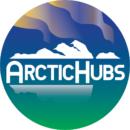Finding a blend and a balance across disciplines, research tools, and livelihood sectors: ArcticHubs annual meeting 2022
ArcticHubs annual meeting , 21-24 September 2022 – Magma UNESCO Global Geopark One of the most ambitious features of the ArcticHubs project has been to draw together research across the diverse, but often interwoven livelihood sectors that are transforming lives and communities throughout the European Arctic. In order to achieve this aim, the project is having to balance inputs from an array of natural and social science disciplines. In turn, …
